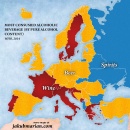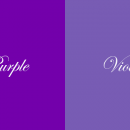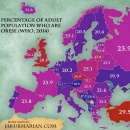 |
Amount of alcohol consumed per capita by country in Europe (map)
Regular consumption of large amounts of alcohol may lead to various health issues, such as cancer, stroke, dementia, and many others, (...)
May 20, 2015 – Jakub Marian – Maps
|
 |
‘At first sight’ vs. ‘at the first sight’ in English
When used with a noun, the adjective “first” is almost always preceded by “the” or a possessive determiner, such as “my”, “your”, “his”, (...)
May 19, 2015 – Jakub Marian – English
|
 |
Difference between ‘violet’ and ‘purple’
People say that a picture is worth a thousand words, so let’s take a look at the two colours in comparison (there are various shades of (...)
|
 |
Percentage of obese population by country in Europe (map)
Obesity is on the rise in Europe, which is a worrying trend, since obese people are several times more likely to develop heart disease, (...)
May 14, 2015 – Jakub Marian – Maps
|
 |
The Raven – Stanza XIV explained
Stanza XIV of Edgar Allan Poe’s poem The Raven is one of the hardest pieces of English literature to understand for a non-native speaker. (...)
May 13, 2015 – Jakub Marian – English
|
By the way, have you already seen my brand new web app for non-native speakers of English? It's based on reading texts and learning by having all meanings, pronunciations, grammar forms etc. easily accessible. It looks like this:
 |
‘Graphics is’ vs. ‘graphics are’ – singular or plural?
There are many singular English nouns that end with an “s”, such as mathematics, physics, or politics. Those are typically names of (...)
May 11, 2015 – Jakub Marian – English
|
 |
‘Dwarves’ or ‘dwarfs’ – which spelling is correct?
It may come as a great surprise to the fans of The Lord of the Rings, but the correct traditional spelling of the plural of “dwarf” is (...)
May 6, 2015 – Jakub Marian – English
|
 |
‘More better’ is not always wrong (but usually it is)
The comparative degree (“more of something”) of monosyllabic adjectives is usually formed by adding -er at the end of the adjective, (...)
May 3, 2015 – Jakub Marian – English
|
 |
Words ending with -ung are feminine in German
There are over 20,000 nouns in German that end with -ung, so if there is a rule that applies to them all, it is definitely worth learning. (...)
May 3, 2015 – Jakub Marian – German
|
 |
German suffix -ant: masculine nouns
There are over 300 nouns in German that end with “ant”, and almost all of them are masculine (i.e. they have the article “der”), such (...)
May 1, 2015 – Jakub Marian – German
|
